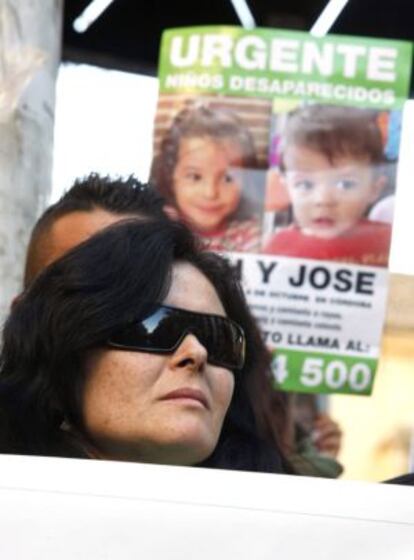Experts agree that teeth and bones found in search for Ruth and José are human
Police forensics had originally dismissed find at Bretón family home as animal remains

The maternal family of Ruth and José Bretón, the two young children who have been missing since vanishing in Córdoba last October 8, said Monday that two independent forensic reports confirming human remains had been discovered at a property owned by the sole suspect’s parents had left them “devastated.”
The children’s father, José Bretón, has been in preventive custody since October 21, 2011 on suspicion of being involved in their disappearance. Bretón himself reported that the children had gone missing in a park in Córdoba city center. Security camera footage confirmed that the children were in the park with Bretón that day.
More than 15 searches — involving dogs and ground-penetrating radar — have been carried out at the Las Quemadillas estate since the youngsters disappeared, but no trace of them was found.
On Monday it was revealed that a study ordered by the children’s mother and family was corroborated by a second report, commissioned by the government, which states unequivocally that teeth and bones found in the remnants of a bonfire in a plot of land owned by José Breton’s parents just days after Ruth and José disappeared are those of two young children aged two and six.
The remains, which were found days after the children disappeared, had originally been dismissed by the police’s forensic anthropology investigation unit as belonging to animals.
The family’s report was carried out by Francisco Etxeberria, assistant director of the Basque Institute of Criminology.
Etxeberria, who has been involved in most Civil War mass-grave exhumations in Spain and in the identification of former Chilean president Salvador Allende, said Monday that there was no doubt the bones found were human. “They belong to two children: one about two years old and the other about six,” he said. “They were the victims of some sort of violent homicide, from a legal and medical point of view.”
The expert said that since the bodies were burned at a temperature of 800ºC there was no DNA to be extracted, nor could the actual cause of death be determined. “The person who lit the fire knew what they were doing,” he added.
When the results reached the government it was decided to commission a second report, which was entrusted to one of the country’s leading paleoanthropologists, José María Bermúdez de Castro. The latter’s investigation also concentrated on the teeth discovered at the Las Quemadillas estate and confirmed Exteberria’s findings.
After his arrest Bretón said he had burned items, including clothes and documents, after recently receiving a request for divorce from Ruth Ortiz, the children’s mother. Days before the children went missing, Bretón bought gasoline.
Both Bretón and his parents have appeared before a Córdoba judge in connection with Ruth and José’s disappearance, and the investigation has always been focused on a possible revenge scenario because of the divorce proceedings.
Ruth Ortiz’s family kept alive the hope that Ruth and José would eventually be found alive and well but Juan David López, a relative of the youngsters, said that the two studies “left no room for doubt.” López also told Europa Press that he had been to see Bretón in jail, where the children’s father admitted he had killed them. “I wish he had been deceiving me,” added López.
Bretón was refused release from custody on three occasions during the search for Ruth and José. Recently he wrote a letter to the media stating that if he were released he would be able to find his children as he believed they would have left clues as to their whereabouts that he could decipher.
Tu suscripción se está usando en otro dispositivo
¿Quieres añadir otro usuario a tu suscripción?
Si continúas leyendo en este dispositivo, no se podrá leer en el otro.
FlechaTu suscripción se está usando en otro dispositivo y solo puedes acceder a EL PAÍS desde un dispositivo a la vez.
Si quieres compartir tu cuenta, cambia tu suscripción a la modalidad Premium, así podrás añadir otro usuario. Cada uno accederá con su propia cuenta de email, lo que os permitirá personalizar vuestra experiencia en EL PAÍS.
¿Tienes una suscripción de empresa? Accede aquí para contratar más cuentas.
En el caso de no saber quién está usando tu cuenta, te recomendamos cambiar tu contraseña aquí.
Si decides continuar compartiendo tu cuenta, este mensaje se mostrará en tu dispositivo y en el de la otra persona que está usando tu cuenta de forma indefinida, afectando a tu experiencia de lectura. Puedes consultar aquí los términos y condiciones de la suscripción digital.








































